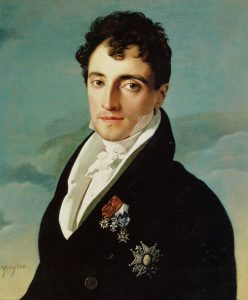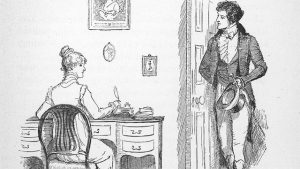
Books are everywhere in Pride and Prejudice, once you start looking for them, and it is interesting to consider how Jane Austen uses her characters’ book choices and reading habits to shed light on themselves. She does this as intentionally and skillfully as she does everything, and reveals much about her characters, often to hilarious effect. Consider Mr. Collins, who recoils at the sight of a book from a circulating library, protests that he never reads novels, and then proceeds to read from the prosy conduct book, Fordyce’s Sermons, which has Lydia gaping instantaneously (ironically, she needs a conduct book more than almost any other girl in literature). We are informed that Mr. Collins is the son of a “miserly and illiterate” father, and that he is “much better fitted for a walker than a reader.” Thus does Jane Austen use books to deftly assist in drawing Mr. Collins’s character.
That great reader Mr. Bennet’s reading habits also illustrate his character, though no specific books are mentioned. It is his overall behavior with regard to books that is on display. His library is his sanctum, his solace in an unhappy marriage, and it is of first importance to him: “In his library he had been always sure of leisure and tranquillity; and though prepared, as he told Elizabeth, to meet with folly and conceit in every other room in the house, he was used to be free from them there.” But Mr. Bennet, by excessively barricading himself within his library, hiding behind his books, abrogates his responsibility toward his family. He is a clever man, a reading man, and feels closest to the daughter who is brightest and most like him in mind; yet all his reading and cleverness have not taught him how to live wisely. His philosophy is to simply resign himself. Elizabeth’s judgment on the matter is shown here, along with a hint of Jane Austen’s suggestion as to how Mr. Bennet ought to have behaved:
“Elizabeth, however, had never been blind to the impropriety of her father’s behaviour as a husband. She had always seen it with pain; but respecting his abilities, and grateful for his affectionate treatment of herself, she endeavoured to forget what she could not overlook, and to banish from her thoughts that continual breach of conjugal obligation and decorum which, in exposing his wife to the contempt of her own children, was so highly reprehensible. But she had never felt so strongly as now the disadvantages which must attend the children of so unsuitable a marriage, nor ever been so fully aware of the evils arising from so ill-judged a direction of talents; talents which, rightly used, might at least have preserved the respectability of his daughters, even if incapable of enlarging the mind of his wife.”

Another, more minor, character illustrates similarly inappropriate, ill-judging attitudes toward reading. That is Mary, the bookish daughter, who has so small a part in the book that one may even wonder why she is there at all, having little role in the drama; but she too serves as an example of injudicious reading, and like her father, her reading fails to to make her wise. Where Elizabeth is her father’s daughter in one way, inheriting his wit, Mary is his daughter in another, and her intemperate reading takes her on a barren path, repeating empty platitudes without displaying any of that quality Jane Austen calls “understanding.”
But what, we ask, does Darcy’s reading tell us about him? Here, Jane Austen tantalizingly leaves out specifics, although she can be specific when it suits her. We know exactly what certain of her characters read, such as Fanny Price’s book about travels in China, or Anne Elliot’s favorite poets, or Catherine Moreland’s clutch of “horrid” novels. Even another hero, Henry Tilney of Northanger Abbey, talks eagerly and specifically about his reading (“I have read all Mrs. Radcliffe’s works, and most of them with great pleasure. The Mysteries of Udolpho, when I had once begun it, I could not lay down again; I remember finishing it in two days — my hair standing on end the whole time”). Not so with Mr. Darcy. Instead, his reading is shown in action, as a comic device in the scene at Netherfield, when “Darcy took up a book; Miss Bingley did the same.” Jane Austen most amusingly shows us how the craven Miss Bingley tries in vain to charm Darcy through her reading maneuvers:
“Miss Bingley’s attention was quite as much engaged in watching Mr. Darcy’s progress through his book, as in reading her own; and she was perpetually either making some inquiry, or looking at his page. She could not win him, however, to any conversation; he merely answered her question, and read on. At length, quite exhausted by the attempt to be amused with her own book, which she had only chosen because it was the second volume of his, she gave a great yawn and said, “How pleasant it is to spend an evening in this way! I declare after all there is no enjoyment like reading! How much sooner one tires of anything than of a book! When I have a house of my own, I shall be miserable if I have not an excellent library.”
What was the book? It seems impossible to guess. Was it a novel? Novels were often published in three volumes, but Darcy remains “inflexibly studious” when Miss Bingley walks to try to attract his attention, which doesn’t seem like reading a light novel. She herself we have seen as “exhausted” by the book. Perhaps he was reading Johnson, a favorite writer of Austen’s own – I have often thought Darcy’s balanced, deliberate cadences had something Johnsonian about them. However, the point isn’t what the book was. Miss Bingley would have behaved the same whether it was Udolpho or Fordyce!
Darcy reveals more about himself as a reading man in conversation. When at Netherfield, Mr. Hurst is surprised to find Elizabeth prefer reading to cards, Miss Bingley jumps on the remark to put her rival in an unflattering light:
“Miss Eliza Bennet,” said Miss Bingley, “despises cards. She is a great reader, and has no pleasure in anything else.”
“I deserve neither such praise nor such censure,” cried Elizabeth; “I am not a great reader, and I have pleasure in many things.”
We may read this with some surprise, thinking that this intelligent girl, close to her father and his fine library, must surely be a great reader. Indeed, later when Elizabeth tells Lady Catherine about her education, we have another indication that she spent a good deal of her youth reading: “such of us as wished to learn never wanted the means. We were always encouraged to read, and had all the masters that were necessary. Those who chose to be idle, certainly might.” However, Elizabeth knows only too well from the examples of her father and sister Mary, that being known as a “great reader” may make her seem pedantic or otherwise a wrong-headed person who cares for nothing but books. Perhaps this is why she refutes the accusation with such unexpected energy, which is a very naturalistic detail in her characterization.
Miss Bingley turns to complimenting Darcy about his library at Pemberley, and while he replies tersely (not wanting to encourage her), his answers are revealing and characteristic:
“‘It ought to be good,’ he replied; ‘it has been the work of many generations.'” This brief description conjures all the glory of the library at Pemberley before us. Then, when Miss Bingley compliments him on always buying new books, he rather sententiously states in his formal style, “I cannot comprehend the neglect of a family library in such days as these.” Meaning that the wealth of fine books being published at this period, positively requires him to add to the glories of the Pemberley library.
At the Netherfield ball, Darcy mentions books to Elizabeth, at a somewhat incongruous moment, while they are dancing. Elizabeth, still in a state of high prejudice against him, nevertheless charms him with her arch conversation, and says, “We have tried two or three subjects already without success, and what we are to talk of next I cannot imagine.”
“What think you of books?” said he, smiling.
“Books — Oh! no. I am sure we never read the same, or not with the same feelings.”
“I am sorry you think so; but if that be the case, there can at least be no want of subject. We may compare our different opinions.”
Even though it’s still a long way until their happy ending together, this speech does seem to foretell a happy future of book discussions at Pemberley, doesn’t it?


12 comments
Skip to comment form
What an intriguing post, Diana! As a devoted reader (I wouldn’t say “great,” LOL!), I have enjoyed the subtle positive and negative lights in which Austen shows her characters as pertains to books and reading.
Thanks for your analysis and thoughts–I enjoyed this post very much!! 🙂
Warmly,
Susanne 🙂
Author
Well, that’s our Austen, Susanne – subtle! Great to see you as always!
That’s as very interesting. Thank you for sharing your thoughts and insights on thiS topic.
Author
You are very welcome, Deborah. I enjoyed myself!
Love it, Diana – I’ve always wondered what he read.
Author
I wish she’d told us, Marcy!
Marvelous! I am new to this blog, but shared this on my Facebook page, and I see a friend has already shard it to his.
Author
Welcome, Anne-Marie, and thanks so much for sharing!
Thanks for an interesting idea to ponder.
I always wonder what books are on the library shelves at Pemberley and Darcy House (and what is on the bedside table.) The descriptions of the library and Lizzy’s reaction are one of my favorite parts of any variation. Perhaps one of the reasons we love Jane’s books and JAFF is that the characters do what we love – read.
Author
We can make some guesses about the books through the research done at Chawton House Library, but it’s not the same as actually being transported in time and imagination to Pemberley Library itself, is it, Mary!
Nice ending Diana. I love the way too, that Elizabeth sidesteps Miss Bingley’s attempt at cattiness! Good post. I enjoyed reading it.
Author
Thank you so much, Diane. It’s so nice to be back…and to see your kind comment!